#Points based rewards systems
Text

Introducing POINTS PLUS: Revolutionizing Retail Loyalty Programs
In an era where customer loyalty can make or break a business, innovative approaches to incentivize and reward consumers are paramount. Enter POINTS PLUS, a pioneering loyalty program designed to elevate the retail experience for both retailers and shoppers alike. More than just a points system, POINTS PLUS represents a paradigm shift in how businesses engage with their customers, fostering lasting relationships built on mutual benefit and satisfaction.
At its core, POINTS PLUS is a comprehensive platform that seamlessly integrates into retailers' existing operations, offering a range of features tailored to meet the evolving needs of today's marketplace. Whether it's a brick-and-mortar store or an online e-commerce platform, POINTS PLUS provides retailers with the tools they need to drive customer engagement, increase sales, and cultivate brand loyalty.
For consumers, POINTS PLUS promises a rewarding shopping experience like no other. Gone are the days of fragmented loyalty programs with limited benefits. With POINTS PLUS, shoppers have access to a unified rewards ecosystem that spans across multiple retailers, allowing them to earn and redeem points seamlessly across their favorite brands. From exclusive discounts and promotions to personalized offers based on purchasing behavior, POINTS PLUS empowers consumers to maximize the value of their shopping experience.
One of the key differentiators of POINTS PLUS is its emphasis on customization and flexibility. Unlike traditional loyalty programs that follow a one-size-fits-all approach, POINTS PLUS enables retailers to tailor rewards and incentives to suit the unique preferences and behaviors of their customer base. Whether it's offering bonus points on specific products, organizing member-only events, or providing personalized recommendations, POINTS PLUS empowers retailers to deliver a personalized shopping experience that resonates with their customers on a deeper level.
Moreover, POINTS PLUS leverages cutting-edge technology, including artificial intelligence and data analytics, to optimize performance and drive results. By harnessing the power of data, retailers can gain valuable insights into consumer behavior, preferences, and trends, allowing them to make informed decisions that drive business growth. From identifying emerging market opportunities to refining marketing strategies, POINTS PLUS provides retailers with the tools they need to stay ahead of the curve in today's competitive landscape.
But perhaps the most compelling aspect of POINTS PLUS is its focus on building genuine relationships between retailers and consumers. In an age where trust and authenticity are paramount, POINTS PLUS fosters a sense of community and belonging, where customers feel valued and appreciated for their loyalty. By rewarding repeat purchases and incentivizing engagement, POINTS PLUS creates a virtuous cycle of loyalty that benefits both retailers and consumers alike.
#Point based system#Loyalty program#Points based rewards systems#Customer loyalty program#Points based loyalty system#Rewards program#Points accumulation#Point redemption#Purchase rewards#Discount redemption#Free products redemption#Loyalty rewards#Customer incentives#Reward points#Redemption options#Loyalty benefits#Point earning#Points redemption catalog#Loyalty scheme#Customer rewards program#Point-based incentives#Reward catalog#Redemption process#loyalty points program#Loyalty points#Loyalty points systems#Loyalty points offer#Loyalty points programs#points based loyalty program#Best Loyalty Points Program
1 note
·
View note
Note
i think that you would be an amazing teacher and i wish i could be in your class
aw thank you so much!! i'm glad you think so.. hopefully i can make at least one student's high school career a little easier, and hopefully i can remind them why they should never stop loving learning, no matter how hard the school system tries to beat it out of them :')
#it's sad how few teachers acknowledge how the school system literally does not promote or reward learning#the way schools are designed now is like... they just want you to memorize. keep it in your head long enough to pass a test#and then you can forget all about it. all that matters are those stupid standardized tests lollllllllll#the way this approach to schooling has decimated how language arts (my subject) is taught is especially infuriating#it's no longer about learning to analyze literature and how to think for yourself while also understanding the author's original message#i see so many people say they lost points on language arts assignments for not interpreting the theme 'correctly'#and that makes me so fucking mad. like yeah it's possible to interpret something incorrectly like just look at tumblr.com#BUT. very very very very rarely is there just ONE 100% 'correct' way to interpret a piece of literature#language arts teachers should not be giving out failing grades when their students pull out new themes and meanings from literature!!!!#they should be EXCITED! they should want to hold a discussion and see where those unique interpretations came from#all teachers should be open to learning from their students. but in a subject as nuanced and subjective as language arts?#it's absurd to act like there's one correct answer because no the fuck there isn't#i believe that as long as the student can explain why they came to a certain conclusion and cite the passages that made them think that-#then like. they're right. their interpretation is valid.#the beauty of literature is different people will pick up on different themes based on their own experiences and personal worldview#i don't understand why that gets punished when that's the whole fucking point of studying literature#anyway#mailbox
12 notes
·
View notes
Text
Things that are a trap and a scam:
1) capitalism
2) gender
3) Kohl's Cash
#thank you for coming to my ted talk#honorable mention goes to any points-based rewards system or app#anti capitalism
1 note
·
View note
Text
The thing is that, while I'm certain Veronica Roth did not intend this, it's clear that the society of Divergent (at least as textual in the film specifically) lacks a Gender Binary of man and woman and instead has a 5-gender system wherein the genders are Dauntless, Erudite, Abnegation, Amity, and Candor. Which is hilarious.
Like. Everything about how their society is portrayed illustrates a deeply gender-segregated society which is organized around an arbitrary set of social groups ("factions"), where labor is (very significantly) allocated according to these factions, where particular behaviors and interpersonal styles are heavily associated with these factions, and where internal compliance with these norms is strictly regulated by other members of the faction. People who do not "fit into the faction system" ("divergents") are either forcibly made into subalterns and expunged from "legitimate" society ("factionless") or otherwise must obscure this fact for risk of the aforementioned social retribution / policing. New recruits to a faction are aggreassively socialized to that factions norms via a regimented system of rituals and violences, often with sexual/homosocial undertones, and are enlisted to participate in this same socializing violence against each other. Those who perform these social violences successfully are materially rewarded with prestige and positions of control. Further, people are a) considered implicit members of their given birth-faction until a coming-of-age ritual, which marks them as having become full (sexual) agents, at which point b) they are expected to typically remain within their birth faction. Unlike many real, extant gender systems, however, there is an in-built nominally socially-sanctioned mechanism for movement between factions, but this movement is always followed with particularly rigorous re-socialization, and acceptance into the faction is particularly conditional on behavioral compliance, particularly when those factions are externally threatened or need to consolidate their bases.
Furthermore, you see nearly no actual in-text segregation among "male" and "female" lines, in ways that are typically considered hallmarks of gender in our world. There seems to be little concern about sexual or semi-sexual contact between people of the "same gender" (which we must then read here as nonexistent), sleeping/living quarters are never segregated along these lines. Neither are sports or combat training (in Dauntless in particular), nor is labor in really any form allocated by the genders "man" and "woman."
I'm certain all of this is unintentional, but if anything I think this illustration of power and social compliance is a more articulate expression of how gender-class (within a materialist feminist frame) actually functions than most "queer" or "genderfucky" media.
#this is my text post tag#in case you were wondering. my wife and i like to watch horrible fucking movies. and then do Marxism at them.#divergent
441 notes
·
View notes
Text
The broken idealist: Higuruma Hiromi
And how the world of JJK viciously punishes idealists.

Before we start, let’s set some premises:
This is an essay based solely on my opinions and my own knowledge of criminal justice. I’m no professional writer/essayist.
JJK is a critique on unfair systems that reward selfishness and nurture individualistic (oftentimes destructive) behaviors.
One of the main motifs in JJK is (un)fairness.
Even when rewarded by these systems, individuals usually end up alienated (Gojo being the utmost example, but so is Sukuna to some extent).
The world of JJK punishes idealists very harshly.
I might've read waaaaay too deep into his character (apologies in advance).
I am ABSOLUTELY biased in analyzing this character because I kin Higuruma very hard and identify profoundly with many of his struggles.
[queue “Pigs” by Pink Floyd] Let's do this.

The ideal of truth and Higuruma choosing to be a criminal defense attorney
Higuruma shows up in the manga as one of the top players of the Culling Games. Throughout a few chapters, Gege introduces him to us as a former criminal defense attorney that has lost it after one of his clients gets his innocence verdict overruled and is unfairly convicted for a crime he didn't commit, triggering Higuruma's cursed technique to awake, ending up in the deaths of the Judge and Prosecutor that contributed for the wrongful conviction.
Along those chapters, we get to see two very interesting things: Firstly, the fact that Higuruma actively chose to be a lawyer, instead of pursuing a career as a judge. Second, his stance and lines about truth, especially this one: "Even if no one else does, I want to keep my eyes open."
Higuruma, for me, is a prime example of how someone moved by truth and justice can become a self-righteous, cynical individual (I'll refrain from the word "villain" because he wasn't ever an actual "villain" in the story). From the get go, when we get more information on his past, we can see his mental state slowly declining as he gets progressively more overworked fighting an unwinnable fight.

We have some very important pieces of information from chapter 158: Japan has a 99% conviction rate. The public opinion about defendants is that they're always guilty. Higuruma earns little, works a lot and his job is usually trying for a miracle, to be that 1%. And, finally, that Higuruma chose to fight an unfair system from within.
That not only has huge parallels with the world of cursed energy, but is one the most important messages I feel that JJK is building up to — you can't reform a broken system from within, because structurally and systematically unfair systems will always push things back into a state of unfairness / status quo. We see this when Gojo says, at the beginning of the manga, that even if he killed all the higher ups at that point in time, other assholes would just take their places. To a more fundamental level, we see it in Yuki's failed efforts to end curses from the perspective of a jujutsu sorcerer, and the way the story is progressing towards a complete rupture with the current state of cursed energy altogether to give place to something new.
The message is: To fight an unfair system from within and by its own rules is and always will be a losing game.
Now to Higuruma's fallout, we have a perfect storm for what happened to him — an unstoppable force meets an immovable object.
I'll dive a little into criminal law (and c.l. procedure) and make many oversimplifications to get a point across, so I apologize to any other criminal lawyers out there reading this and cringing at the oversimplifications.
In theory, the Criminal Justice System should be preoccupied with the truth. Criminal Law, in essence, is attributing a penalty (prison, fine, death, etc.) to an act (to kill, to rob) described by law as a crime. In that regard, then, one could only suffer said penalty if they actually committed the act that the law described as being a crime.
Where does truth come into place here?
To investigate if something happened in the world of facts (the real, concrete world) is essentially a search for truth, which to me is very telling of Higuruma's choice in becoming a criminal defense attorney.
In an unfair system in which 99% of people are convicted, it'd make no sense for this man to become a prosecutor. The prosecution is already benefiting from the system, considering the way the scales are tipped. That's a given.
But regarding the judgeship, things become more interesting. In a fair criminal justice system, the judge is forbidden to engage in probationary activity (which means, basically, that the judge cannot search for evidence, investigate or look for witnesses, he can solely analyze what the defense and prosecution bring to him in order to give a verdict — the judge does not engage in the most important activity in finding the truth).
Why can't the judge do that?
Because when the presumption of innocence is in place, anyone is presumed innocent until proven guilty, ergo, if there is not enough evidence to convict, the person must be acquitted. If the judge engages in that activity, they'd be taking on the prosecution's job — to prove the occurrence of a given criminal act. We have separate places for judging and prosecuting for a reason.

The scales are already in favor of the prosecution (they literally have THE STATE’S aid ikn the form of police forces to investigate and taxpayer money to foot costs during criminal lawsuits), so anything that might end up harming or weakening the presumption of innocence is strictly forbidden, including having the judge engage in probationary activity. If the lack of evidence is enough to acquit someone, then having the judge searching for evidence automatically harms the presumption of innocence, because if there is not enough evidence to convict someone, the judge MUST acquit.
In that scenario, then, the best place for someone who wants to search and defend the truth against unfairness is the Defense stand, clearly.


Everything said up until now about how the criminal justice system should work is just the theory, however. The reality of it is far sinister. The criminal justice system is a machine perfectly conceived to chew out those who fight for fairness, because fairness is not one of its main goals. It's main goal is serving as an instrument of power (in the most Foucaultian sense of the word) and control over citizens and, to some degree, appease collective concerns about crime rates and violence by making examples out of people, whether they're guilty or not (I could go on a tangent here for hours about the criminal justice system, capitalism and protection of private property by the state, but let's not do that, lol).
That's why Keita's trial is the perfect storm to break Higuruma's psyche so deeply. All the systematic unfairnesses that exist in the Japanese Criminal Justice System chomp away his ideals — one might say, what constitutes the very core of who he is — and unceremoniously spits it right back in his face.
Independent defense lawyers are systematically in a worse position regarding resources to gather evidence in their client's favor; it's easier to convict someone who's already under the gavel than to start a new investigation on somebody else and spend even more taxpayer money; to convict a person whom the people deem as guilty soothes the public opinion regarding how well the criminal justice system actually works to "keep society safe from these foul criminals" (not human beings); the appeal is a limited resource in most criminal justice systems, so after one gets their innocence verdict overturned, to get it back is extremely hard.
Everything worked perfectly to break every inch of Higuruma's ideals. It's no use for you to be the only one willing to stare truth in its eyes if everyone else looks away because it's more convenient to let the unfair gears keep turning the way they do. You'll give yourself to unnecessary suffering meanwhile nothing ever changes. This could even help draw a parallel between Higuruma's and Geto's fallouts: to realize how broken the system is, how you can't break a wall with the toy hammer the wall builders give you, and how lonely/depressing/infuriating of an experience it is to realize all this and still know there is absolutely nothing you can do.
The game is rigged, and if someone ever so chooses to not play by those rules, they're viciously punished.
Now that we've gotten to the breaking part, let's see how it manifests in Higuruma's own cursed technique and domain expansion.
The broken idealist and the cynicism
Someone had made an amazing post about how Higuruma's domain expansion was a perfect demonstration of his own cynicism at the moment his abilities were awakened, but I couldn't find it! So OP, if you by any chance end up reading this, HMU, because what you said will be featured here. (Edit: found it. Thanks, Eugie! The post can be accessed here, and @wolke17 made a deeper analysis after it, take a look at their profile)
In order to talk about Higuruma's cynicism stemming from his disappointment with the criminal justice system, we need to talk about his domain, so that's what we're gonna do now.
In his domain expansion, we meet his shikigami, Judgeman, who is an all-knowing creature responsible for giving off the verdict at the end of the debates between the two parties. According to Higuruma, Judgeman knows absolutely everything about someone's life the moment they enter his domain.
All is well up until now, isn't it? Hm, not so much. There are some very serious philosophical conundrums to having an all-knowing being bestowing judgment (skeptical catholics went crazy over this for many centuries).
Think about this: in a Courtroom, we have a judge who needs to get to know the facts, and is presented with two different hypotheses about the facts (prosecution and defense), for which the evidentiary activity (collecting evidence) is needed to support one hypothesis or the other. Given that we abide by the presumption of innocence, you don’t even have to prove the defense’s hypothesis to get an acquittal, as long as the prosecution one isn’t proven beyond a reasonable doubt.
What’s the issue with having a judge that is omniscient?
First off, why would two hypotheses need to be confronted if the judge already knows the answer — if the person did or did not commit the crime?
On another note, now going into more of a “well he’s just judging based on the allegations”, it gets deeper. We have a judge that knows what happened, but simply decides based on the parties arguments. This is a huge issue because firstly, it obliterates the value of truth in the justice system — if criminal law is attributing to a particularly reprehensible action a penalty, and judgeman knows if that action took place or not, yet doesn’t decide according to what happened, but according to who best defends their point of view, it annihilates the very own reason for collecting evidence, the reason that a judgment needs to take place and the reason for criminal law even existing.
In Higuruma's domain, then, truth becomes the least important thing. In there, who has the better argument wins the debate. The judgment that happens within Deadly Sentencing is not about truth, it’s about the game's rules (or, more specifically, his domain's rules) and who plays them better, which makes it all the more ironic that Higuruma sees so much “potential” in the Culling Games due to its rules and established mechanics.

In a courtroom setting, having an omniscient judge is always, in any scenario, a cynical game of wits, and it fits perfectly with the philosophical fallout Higuruma experienced after Keita's conviction. His perspective got switched from "who deserves to win according to the truth" to "who plays the game better". He lost faith in the criminal justice system, and to a deeper degree, he lost faith in fairness in the world as a whole.
And that's why we can arrive at the conclusion that Higuruma is, in essence, a "broken idealist" character: he's not pandering to the idea that "the winner should be the one who plays the rules better” because he truly believes it; he's doing it out of resentment, because he got time and time again punished and was subjected to a hell of a lot of suffering for upholding his own ideals of truth and fairness. He's not acting, he is reacting to being unraveled and broken the way he was.
It also shows in his discourse regarding the weak, and the way he tries to place himself above what he dubs “the ugliness of people”, as the only one who sees the truth (“darkness is only darkness / people are ugly”). It’s a mirror: he experienced his own helplessness (or weakness) with Keita’s conviction, so in an effort to try and protect whatever is left from his own psyche, he’s actively denying how helpless he really feels by putting himself above the “truly weak”.
In the end, however, Higuruma kept his idealistic essence alive instead of giving himself over to the story that he told himself as a defense mechanism, unlike Geto, which is why it was possible to bring him back.
Even broken, he remained an idealist at heart.

written by tsukimefuku ㋡ comments and reblogs are appreciated. do not copy, translate or repost. copycatting is for losers.
#jjk#jujutsu kaisen#higuruma hiromi#jjk higuruma#higuruma#jjk hiromi#hiromi jjk#jujutsu#tsukimefuku#fuku writes
206 notes
·
View notes
Note
Can you write a dead on main? Something with a bookstore au please!
Now that I know the ship names, you bet I can! I'll try my best to get through the ones I got requested in the past few days.
Jason liked bookstores.
They were a safe haven for him as a child, even when the fancier ones chased him off when he became a street kid. He adores the various series, the smell of books, and the quiet of stores. Often he thought that they were a small pocket to escape reality.
He had always known he could escape between the pages when everything had been terrible.
Maybe that's what lead him to this store even if it was a bit odd.
It was out of the way by the old docks that Joker used to run, thus making it condemned to the rest of the populace.
An old warehouse turned into a three-story bookstore. The entire first floor was aisles placed in side-way lines with the main counter as its center. The second floor had cozy reading nocks, plush futon couches, pillows, and blankets, complete with a small cafe. The rule was that anyone could take a book off the second-floor walls to read for free.
Employees asked to be informed if any food or damage was done to the second floor since the second book only had one copy of each. The owner would pull one off the bottom floor shelves to replace it.
The final floor had various reading rooms, but Jason loved that each room was based on a book. The room was professionally decorated to the point it left visitors feeling like they actually stepped into the world of the book.
Sculptures, playable settings, phenomenal little details the hard die fans could spot, and even sound systems playing sounds that sounded like the world. Jason could only compare it to Disney World or universal studios. The fact that people could rent the rooms for an hour for only fifteen dollars made them much more popular.
The third-floor rooms- ten in total- would rotate between series after a few months. Hence, the rooms were always different, but inside them were recommended books with the same kind of theme that was always the perfect recommendation, or maybe people just wanted to explore a room of their favorites.
Jason had visited the strange little bookstore with Tim after his brother had gone on a date with Bernard there.
Tim and Barnard had rented the "Hogwarts common rooms" room for three hours. Jason had been amazed by how real the four standard rooms looked, how there were even dragons spitting fire in one corner, moving portraits, a sorting hat ceremony, a small teddy bear decorating corner, and even a wand building second. All for only fifteen dollars. Tim had practically been glowing when he came home with his Ravenclaw bear and his own wand.
And maybe Jason is a huge Harry Potter fan; perhaps it was one of the first things he boned with Tim over, so maybe his brother had taken him to have an experience that he compared to the first time Bruce took him to Universal Studios.
Then he ran into the owner while one of the employees had been helping him pick runes to have burned into his wand.
Jason started to come back for an entirely different reason.
"Hi, Jason!" Elle says when she sees him climbing the stairs toward the third floor. She's the store's co-owner and has gotten to know him on a first-name basis due to how often Jason has visited the store in the past year. If they made a reward points system, Jason knows he be the highest one on the chart.
She's sitting at a table that is decorated like a galaxy. The books for these quarters' room themes are on the table's surface, all with a door key under them and a clipboard for the various hours.
Jason's eyes land on Pride and Prejudice, and his heart leaps.
"Hi, Elle. What's the wait time for door seven?"
She smiles, flipping the clipboard to the time slots. "The Ball at Netherfield Park has a lot of openings today. I got a three, four, six, or seven. When shall I fit thee dance card in milord?"
Jason laughs and checks his phone, ensuring he doesn't need to do anything for a while before saying. "Three will be fine. It's only thirty minutes. I'll go get a coffee while I wait."
She nods, writing his name down for three. She then passes him some disclosure forms he has to sign, forgoes the long-winded explanation of the rules, and sends him on his way, promising to send him a reminder text.
"Just so you know, Ball at Netherfield Park comes with a unique costume option. Five extra dollars to go through our costume section, and you can dress up like Mr. Darcy for a full hour."
Jason shakes his head though it's a very tempting offer. "Thanks, Elle but I'm okay with my street clothes today."
The other shrugs and checks her nails- their asexual theme today, he notes- before nonchalantly commenting. "Too bad. Danny really wanted someone to cosplay with him. Jane Austin's books are less prevalent in Gotham than we thought, and he's been dying to wear his Mr. Bingley outfit. I thought you like to, so I told him to come over when you arrive, but I can text him to cancel-"
"Five dollars, you said? For the full outfit or just like a coat?" Jason ignores her smug expression and quickly places a twenty on the table.
"Full outfit. What do you take us for?"
He glares at her just as the man of the hour himself runs up the stairs. Danny Fenton, founder, and co-owner of Ghost Zone Reads. He's in a light blue Regency period man coat that makes his eyes pop. A pair of white pants that hug his hips and thighs in all the right places, black knee boots, and a black gentle top hat.
Jason's knees go weak at the sight of him.
Danny's face is flush from the run, but his whole face lights up when he sees his sister and her guest. "Jason! I'm so glad you choose the Ball at Netherfield Park experience. I can't wait for our dance."
"Dance?" Jason chocks. Elle chuckles.
"You can't experience a Ball at Netherfield without the ball part dingus." She waves a hand at her brother. "Told him Dick canceled on you, so he offered to step in."
Jason never even mentions Dick to her but he's not about to call her out on her lie. She's doing him such a big favor.
"I always wanted to go to a Jane Austin ball!" He says instead, mentally wincing at how lame he sounds. Thankfully Danny's eyes only light up even more as the other man starts explaining the instructional videos installed in the ballroom mirrors so they can learn the real moves of Contra Dancing.
Jason falls just a tad bit more.
(Elle watches with a fond smile as Jason and Danny get lost in Austin's most significant works. She quickly texts her allies in Wayne Manor under the table. This is a big step in the "Make us in-laws" operation; the Fenton and Wayne children started a few months back. They were all tired of watching Danny and Jason dance around each other. Damian's idea to use Jason's favorite author was working fabulously.)
#dc x dp crossover#Ghost Zone Reads#Dead on main#request#jane austin the way to Jason's heart#Danny and Dani run a bookstore based off the idea of Ghost Zone's magic doors#It's a huge success#(Yes Danny kills the joker off screen when the man tries to take his store)
1K notes
·
View notes
Text
I’ve seen this… absolutely out-of-touch take a couple of times now, and it relies on my old “favourites”—flattening transfem experiences down to a single experience and then declaring transmasc experiences to be the binary opposite—so let’s make a post about it now, shall we?
The take I’m talking about this time is: “trans women/transfems/MtF people are transitioning from male (prioritized sex) to female (oppressed sex) and as such the oppression they face is based on the fact that society sees them as doing the bad transing thing, but also devaluing themselves/making themselves lesser. Therefore, trans men/transmascs/FtM people face less oppression for coming out because sure they’re transing, but they’re doing it in a direction that elevates them in society’s eyes.”
Like… uh. You kinda had me in the first half. Because yes, part of transmisogyny is definitely what was described above. It isn’t the total of what transmisogyny is, though, and I think it’s important that we note that.
If the take had stopped there, while I may have still found it reductive of transmisogyny as a whole depending on how it’s framed, it wouldn’t really have bothered me because it’s not really wrong per se, just potentially reductive. And snappy posts sometimes are a little reductive in order to get the point snappy, so whatever.
But it hasn’t stopped there when I’ve seen this take, because the only time I’ve seen this take is to continue it to talk about why transmacs are “not as oppressed” as trans women. As if there’s ever an easy answer to “which broad group of people is more oppressed” because intersectionality complicates that SO MUCH that even a question of “if all other things are equal then who is more oppressed” is fraught because rarely are all other things equal even when they may appear to be. But anyway…
The idea that trans men, when they are known as trans men so that people are aware of the transition, are thought to be making themselves privileged or giving themselves a higher position on the oppression Olympics totem poll is straight out of the radfem playbook. Trans men’s maleness is not seen as them elevating themselves to be men, it is seen as an affront to masculinity and maleness. This isn’t treated by society as someone elevating their position, but as someone trying to destroy the system which artificially rewarded certain members of society based on being “born the privileged gender”, and so an affront to society.
It really makes me think that the people making these takes have talked to no transmascs, or only the few who will willingly play into transandrophobes in order to be seen as “one of the good ones.”
#my post#transandrophobia#transmisandry#edited for a few missed words#such is the joy of brain going faster than fingers
227 notes
·
View notes
Text
The Chain Game (2/3)
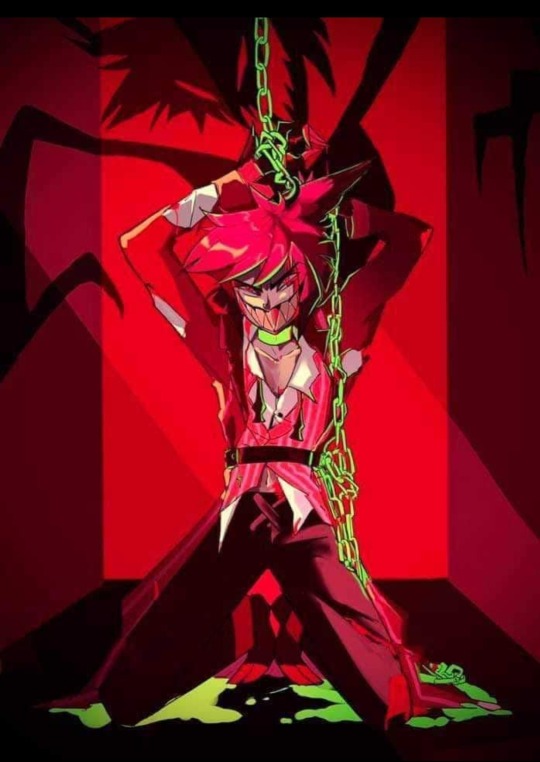
[If anyone knows who I can credit for the above Fanart; PLEASE let me know! This was something sent to me and I haven't been able to track down the artist myself yet...]
Part 2
RadioApple SMUT
Part 1: Here
Part 3: Here
Brainrot into one-shot fanfiction
Rating = 18+
Word Count = 1,726 Words
Ya'll can thank @lily-lilzy-lil for it. She fed me with her kind enthusiasm. Enough so, even that I might already have a part 3 in mind...
“Are we ready for another round?” Lucifer’s voice came from the surrounding darkness.
Alastor hung…kneeling. He was bound tightly by the chains winding across his chest; wrists secured within the links wrapping above his head. The large brimstone shackle was heavy on his neck; the chain to its ring hanging loose and dragging beside him.
“Heh…is that one of the questions?” Alastor smirked, his voice a crackling radio.
A chain slithered from the blackest of shadows; twisting and hissing as it found its way home; curling itself up Alastor’s naked torso and tightening painfully. He hissed as the links burned more brands across his bare, scarred skin.
“Yes.” Lucifer told him, stepping out from concealing shadows. “It was.” He was shirtless – bare-chested – just as Alastor was; his dress pants and shoes the only remnants to the clothing he had been wearing.
Alastor starred at the King’s exposed upper body. The radio demon’s green eyes flared wide – hungry and gleaming – drool seeping from sharpened teeth. The base to each of his antlers thickened; the smooth bone becoming heavy and long as points branched higher and higher above his head.
“Are you enjoying yourself?” Lucifer asked him. “Still rutting I see…”
The demon growled; a low sound intermingling with the sharp sounds of a radio static.
“And, still losing.” Lucifer sighed, another chain slithering past him to lift and strike out just like a snake; catching and winding itself through the ring to the shackle just at the base of Alastor’s throat. The chain jerked and Alastor’s neck was pulled sharply forward.
“You look like you have sobered up, though.” Lucifer told him; approaching carefully. “Tell me, Alastor…now that my ichor has left your system; are you thirsty for more?”
Lucifer flicked clawed fingers; bringing sharp points against his own bare skin, just at the soft bunch of flesh that stretched across one shoulder. Slicing there, gold blood seeped and spilled from the cut; threading down his chest and abdomen.
Alastor snarled in answer; his eyes flaring brighter, antlers growing longer, his hair standing up – sharp and bristled; overwhelmed by his overpowering need.
“Yes…” The radio to his voice nearly screeching. “…your majesty…”
“Well, now.” Lucifer stepped closer. “Honesty and manners this time. A reward for you…I think.”
A chain dropped from Alastor, winding its way back into the dark as the other chains still supporting him shifted and moved. Alastor’s hands were released but the chains encircling his chest and neck were dragging him backward so that when they found their placements; the radio demon was stretched fully on his back; pinned to the ground. He tried to move; trying even to just to be able to prop himself up in order to see what the King was doing; but the chain tightly secured to his shackle held fast.
Alastor’s ears worked nervously. He was starring up into complete darkness; his body tense with the knowledge that Lucifer meant for him to not know what was coming.
When he felt Lucifer’s hands on his legs - moving them so that they were spread easily wide apart - and the King moved between them, Alastor growled. The sound was low and warning; promising a deadly reciprocation to whatever the fallen angel intended; given the chance…
He felt the King moving, climbing over him so that he leaned across and over Alastor’s chest; his hands supporting his weight from either side of Alastor’s head. Lucifer’s wide golden eyes matched Alastor’s flaring bright green ones; a wicked smile spread across the King’s face as he leaned himself closer to Alastor’s face. Baring his sharp teeth and flattening his ears, Alastor fought to lift his head; meaning to bite. The chain restraining his neck tightened and any give that Alastor had found in it before was now lost.
Laughing, Lucifer smiled down at the sinner demon lying just beneath him.
“I promised you your reward. I keep my promises, Alastor.” Lucifer told him, leaning closer so that they were face-to-face; Lucifer only just out of reach from Alastor’s sharp and pointed teeth. Lucifer tilted his head; fully exposing his still-bleeding wound he had opened across his shoulder.
Alastor’s growling choked in his throat; seeing the golden strands tracing down the King’s chest; sparce warm drops falling onto Alastor’s bare skin. The growling had turned into a brief but desperate whine for relief; Alastor’s clawed hands digging into the ground beside him; finding no purchase – claws cutting grooves into the dark floor.
“I’m afraid you’ll have to use that rather useful tongue of yours.” Lucifer was telling him; leaning back just enough to give Alastor the best angle for full access.
Without a moment for hesitation, Alastor’s tongue lashed from between his bared teeth – long and dripping - it lapped at the streams of golden blood. A groan emitted from Alastor; barbs from his tongue pressing roughly against the fallen angel’s skin as he hungrily scraped for every…last…drop.
Alastor’s eyes started glazing over and Lucifer chuckled.
“You’re not a very fast learner…are you.” Lucifer said darkly. It wasn’t a question. Alastor’s tension was gone. Drunk with the angel’s blood; he retreated his tongue – eyes closing as he let his head fall back.
Leaving him to his buzz; Lucifer crawled back down to kneel between Alastor’s long legs. He began working at the radio demon’s dress pants; reaching just behind the seam at the crotch, finding the bulge within and sliding Alastor’s seeping and engorged cock out.
Alastor shuddered; pleasurably. Gasping at the contact.
“You know,” Lucifer said, holding the large penis in his hand. “I, too, can do some pretty…interesting things with my tongue.” His eyes flared; sharply golden. “Shall I…demonstrate?” He asked in a purr.
“Yes.” Alastor was groaning again. “Your Majesty.”
“That’s my deer…” Lucifer told him.
Using his own tongue now, he let it slither from between his teeth. Just as a snake’s, it stretched and flicked itself so that it tortuously skimmed the underside of Alastor’s cock – touching all along the base and shaft underneath then going to flick at the soft skin along his balls.
Alastor was panting. A redness was spreading across his chest and face; a slick sheen of sweat coating his skin.
Lucifer continued to teasingly flick his tongue all along Alastor’s root; occasionally bringing it around to circle the shaft. The muscle there was tightening quickly.
Pausing briefly, Lucifer adjusted his hold on Alastor’s throbbing penis. “Careful, you don’t want to miss out on the best part.” Snaking his tongue out; Lucifer carefully elongated the shape so that the forks lengthened and thinned. Expertly, he directed the tips to the slit at the head of the slick cock; sliding them inside.
Alastor bucked and Lucifer pressed clawed hands into each hip; holding him steady and he worked his tongue so that it slid in further.
“Ah….” Alastor was lost. The stimulation was too incredible. Timing it perfectly, Lucifer snaked his forked-tongue deeper before slowly retreating it back out. Alastor’s body shook. Removing his tongue entirely; Lucifer took Alastor’s cock fully and quickly into his mouth; biting down sharply just as the organ tightened and sprayed cum.
Softly coiling his tongue all along the twitching cock; Lucifer sucked and swallowed before dropping it limp from his mouth.
Lucifer stood up from where he had been kneeling; there, between the radio demon’s legs.
Alastor laid, still panting and gasping. The deep red color his skin had turned was contrasting the brands of chain links in an interesting way. His clawed hands were shaking and he was drenched in sweat now. His body twitched; still feeling the waves of ecstasy crashing over it.
Lucifer laughed; stepping away to loosen his own dress pants now. He paused; then as if deciding something he slipped out of the remaining clothes entirely.
“You certainly know how to take your…licks.” Lucifer said. “If you actually are in the middle of a rut though…it’s you that could do with some mounting. I suppose you’re in enough of a manageable state that I could allow it.”
Lucifer stepped back to where he had left Alastor; still tightly restrained to the floor.
“What say you?” Lucifer asked him; the chains around Alastor coming loose now but never fully leaving him.
Alastor moved slowly. He was dazed; both from the remnants of ichor and the orgasm. Turning, he went to stand up; then thinking better of it he knelt back to the floor; eyes on the King.
“Your majesty…” Alastor knelt; looking up – compliant.
“Good boy.” Turning away from him – fully naked - Lucifer waved a hand and every chain holding Alastor dropped and went away into the dark; every chain save for the one holding to Alastor’s heavy brimstone collar.
Alastor smiled; standing and going to the King; dragging his chain with him.
Stopping to stand just behind Lucifer, Alastor paused; eyes flaring green, his antlers curling and twisting ever upwards.
“You may…regret this.” He said before he sunk the claws of his left hand into the flesh of Lucifer’s left hip; pulling the angel into him and spilling more blood. His right arm wrapped around the King, his clawed fingers finding his face and mouth; shoving them inside. Snarling; he bit deep into the wound at Lucifer’s shoulder; swallowing hard as golden liquid poured out.
“Ahhhhhh…” Lucifer sunk to his knees and Alastor followed him down. His teeth still buried in the fallen angel’s shoulder; he forced the King down on all fours. Lucifer choked on his fingers; golden blood pooling on the ground from his wounds.
Gasping, Alastor released Lucifer’s shoulder. His vision blurred and darkened; the influence of angelic blood mixing with the influence of his rut. He was already hard again; his erection pressing fully into Lucifer’s bare back.
“Now…my King.” Alastor was purring darkly; sliding his fingers from Lucifer’s mouth. “I will gift to you the most fitting of thrones…”
Lucifer gagged; blood and spit running down his chin.
“Do your worst…my deer.”
--‐‐--‐‐-‐--‐----‐---‐----------‐--‐----------------------------------------------------
Alastor jerked awake; déjà vu catching him even in his ‘half-asleep’ state.
“Oh, what the Hell-” Followed by a sleepy yawn. “What fucking time is it?”
The room was pitch black; then a bedside light came on.
“Uh...” Alastor said, shifting awkwardly in the bed.
“AGAIN!?” Lucifer exclaimed loudly.
“Well…” Alastor replied.
“If this keeps happening, you and you’re one-eyed monster are sleeping somewhere else!”
------------------------------------------------------------------------------
Part 3
Brainrot credit:
@De Bergerac
The Masochism Tango
#hazbin hotel#hazbin hotel fandom#hazbin alastor#alastor#hazbin hotel alastor#hazbin hotel fanfiction#fanfiction#hazbin lucifer#lucifer morningstar#alastor x lucifer#alastor and lucifer#radioapple#appleradio#hazbin hotel smut#radioapple smut#my fanfic#the chain game#guess I can write gay smut#and it doesn't JUST do it for me#who knew?
356 notes
·
View notes
Text
The Sims 4 Mod: Social Event Overhaul (TEST VERSION)

Social Event Overhaul updates social events in The Sims 4 to use the activity selection system from Lovestruck and My Wedding Stories, as well as other changes to how social events work.
THIS IS AN UNFINISHED TEST VERSION! USE AT YOUR OWN RISK!
There may be bugs I haven't found yet. In fact, since there's over 100 activities to choose from, it's very likely at least a couple of them have bugs.
Other Changes
In addition to selecting activities, this mod makes other changes to social events to make them better.
You can invite Sims that anyone in the household knows, not just the initiating Sim.*
You can invite any Sim aged Toddler and above for both the host and guests.*
You can select Sims from outside the household as the host. This doesn't change how goals work, but lets you simulate being invited by another Sim.*
All Sims in the event will automatically be added to a group. This makes performing "Do X Together" interactions easier.
The "Plan a Social Event" interaction is available for all ages.
The "Plan a Social Event" and "Plan a Wedding Event" interactions start immediately, without waiting for an animation to start and complete.
NEW: Hired roles (Bartender, Entertainer, etc) have been removed from the Plan a Social Event UI and replace with activities like "Hire Bartender". There are a lot more to choose from and you gain points for completing them.
NEW: Wedding Events from My Wedding Stories have actual goals with rewards. Wedding Ceremony and Vow Renewal events will give the same rewards as base game Weddings, Dinner events will give the same rewards as Dinner Parties and other events will give the same rewards as House Parties.
NEW: Ranch Animal Day and Ranch Gathering events have new main goals (Interact with Animals and Hosts Socialize with Guests, respectively). Originally, the goal was to make Sims Happy at the same time, which was very annoying since any other positive emotion overrides Happy. Ranch Animal Day also works with any animal from any pack - you no longer have to have Mini Goats or Mini Sheep.
*Currently, filter changes only apply to events that use the default event filters. In the full version, they will apply to most if not all of events.
Download
Download from Google Drive
I recommend also downloading my Organized Event Planning mod to sort activities alphabetically, otherwise they may be hard to find.
174 notes
·
View notes
Text
Truth be told, I'm not resistant to XP/rewards being given out for, like, narrative-based triggers instead of just overcoming challenges. However, the D&D 5e DMG's presented method of milestone leveling is one of the worst ways to go about it in my opinion.
Part of the problem is that D&D 5e presents a choice between an XP system that only rewards combat (which, fair enough, has been the main source of XP since we, but even 3e and 4e had other sources of XP) and a system that removes all incentive structures altogether. Like, it feels like the game itself is reinforcing a false dichotomy of "combat play" and "narrative play."
There's a reason I like XP systems (albeit ones with much smaller numbies) even in my non-dungeon games: they make advancement objective and dependent on player choices instead of up to GM arbitration. Like, this here is an experience point system and it rewards player choice while keeping the XP numbers manageable (the hardest part of XP systems in my personal opinion is XP numbers being too fine-grained: once you start measuring experience in the thousands with very little gradation between rewards of a hundred and two hundred points, you know something's wrong):


And it reinforces the genre the game is going for. That's actually pretty much all there is to XP in the game, there's no hidden secret formula for calculating combat experience because the game doesn't care about fine-grained combat experience. It still gives recognizable incentives to the players with a bit of leeway for interpretation and ultimately rewards play. (By the way, this is from Against the Darkmaster: there are vocation-based sources of XP in addition to these.)
Anyway what I'm trying to say is that XP systems actually own.
149 notes
·
View notes
Text
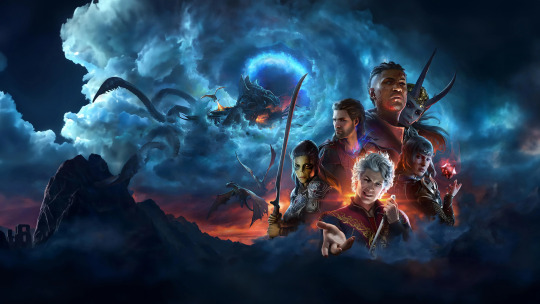
The Mechanics of Baldur's Gate 3
As someone who's constantly tinkering with the mechanics of my favourite RPG, I LOVE a lot of what Larian has done with D&D; not only accurately translating the base system but improving upon in ways I never thought of.
Playing BG3 feels good, and I want to see how much of their work I can adapt for my own table. As such, here's a breakdown of a bunch of little tweaks they've made to 5e (taken from the bg3 wiki) and whether or not I think they're a good fit for regular pencil and paper d&d.
Shove is not a part of the attack action. It is a bonus action available to all characters. Shove only pushes the target back an amount that depends on the shover's strength and the target's weight. It normally does not knock them prone unless they are shoved off a high ledge.
This might be THE best design Larian implemented and is instantly going in my games. Bonus action shoving is such a natural addition to combat, gives so many more tactical options. My one protest is that I am NOT calculating the weight of every creature and object ( mainly because I'm terrible at guessing weights for things) so I'd go with the distance calculation based on the creature's size and con score.
Gaining inspiration based on backgrounds
Gee, a mechanical reward for roleplaying your character, one that's way more straight forward than the DM arbitrated "ideals, bonds, flaws," system. From now on I'm going to give each of my players an upfront " You gain inspiration when you ______" note on their character sheet based on their backgrounds.
The party is limited to two short rests per long rest. Short rests restore each ally's hit points by an amount equal to half their maximum HP (rounded down). There is no hit die rolling. Long rests require camp supplies, which are food items that must be looted or purchased. In towns you will be able to rest at an inn.
This is a mixed bag for me only because I like hitdie as a mechanical abstract and I don't want to see them removed. Tbh I wish more mechanics interacted with them and they were called something abstract like "stamina" or something. That said I ADORE the camp supplies idea because it not only gives you something minor to reward exploration with besides GP. On the otherhand tracking all those supplies without the game's inventory management would be tedious as hell so it'd need to be highly simplified.
I especially like the idea of limited short rests/supplies in larger survival based adventures where time isn't at a premium like it is inside a dungeon.
If you hide while not in a creature's sight cone, you automatically succeed. If you try to hide while in a creature's sight cone, you automatically fail. If you are hidden and enter a creature's sight cone, you must roll stealth against the creature's passive perception. This may be a straight roll, advantage, or disadvantage, based on the creature's senses and the level of lighting. Some creatures with different senses such as blindsight may follow different rules
Congrats on fixing stealth rolls Larian. No notes.
LOTS more opinions under the cut.
When a creature is at least 10 ft above their target and makes a ranged attack, they receive a +2 bonus to the attack roll due to high ground. When a creature is at least 10 ft below their target and makes a ranged attack, they receive a -2 penalty to the attack roll due to low ground.
This is fine, and quite inline with a lot of fixes I've seen for flanking rules. I'm fine with a little extra battlefield math in order to make moments of advantage (spending inspiration, reckless attacking etc) shine.
The game does not stop a character from casting a leveled spell with both an action and a bonus action
Mixed on this, on one hand I've played enough clerics to know how much it sucks to have to use your bonus action to do a necessary spell and then be stuck with a so-so cantrip or melee attack for standard. On the other hand there's some design balance issues at play here.
Help is an Action. This ability allows characters to aid an ally in combat and remove negative Conditions. Using the help action on a downed ally brings them back to 1 hit point and leaves them prone.
Love the idea of help doing multiple things AND being a solution to minor status conditions. and giving everyone the ability to help means I can be a lot more aggressive when it comes to knocking character to 0. if I had to further patch this, I'd say that this also allows for a medicine check to allow a creature to spend a hitdie when they're downed, or allows the helping character to make a "SNAP OUT OF IT, WE'RE YOUR FRIENDS" charisma roll for charmed allies.
Jumping is a bonus action which consumes 10 ft of movement speed. With a Strength score of 10 or below, a creature can jump 15 ft, and this increases by 5 ft for every two points in strength above 10. At 20 Str a creature may spend 10 ft of movement speed and a bonus action to jump, and can travel 35 ft effectively increasing the creature's movement speed by up to 25 feet.
This, combined with the prone rules (see below) is JUICY, as it allows for risk-reward battlefield mobility . That said I'd add some caveats/clarifications: The jump always succeeds in moving you, but if you're taking damage, jumping up or down more than 10ft, or into rough terrain you need to make an acrobatics check not to beef it and fall prone (ending your turn). Your jump is likewise a buffer for how far you can willingly fall before taking damage, but if you fall after your jump, you always land prone.
Weapon actions, 'nough said.
It's more complexity than I'd give to first time players but HOT DAMN if it isn't a great idea to give the martial characters some options instead of just making the same attacks over and over again. I've actually been sockpiling 3rd party versions of this for a while now and I can't wait to add them in.
All The conditions are great:
Blinded: In addition to the other effects, ranged attacks are limited to 15 ft range. Blinded creatures can also make opportunity attacks.
Frightened: Creatures which are frightened are unable to move at all (rather than being unable to move toward the source of their fear), unless the effect instead makes them "fearful" which gives them the frightened effect as well as making them flee.
Prone: Being prone gives disadvantage on Strength and Dexteritysaving throws, attacks against a prone creature have advantage out to a range of 10 ft rather than 5 ft, and ranged attacks against a prone creature do not have disadvantage. Your character cannot do anything while prone. Starting the turn while prone will cause you to automatically use half your movement to stand up. Becoming prone during your turn automatically ends your turn.
Wet: This is a new condition that prevents the character from burning (e.g. from Searing Smite) and grants resistance to fire damage, but also makes the creature vulnerable to lightning and cold damage
#bg3#baldurs gate 3#d&d mechanics#dnd homebrew#homebrew mechanic#dnd#dungeons and dragons#d&d#ttprg#pathfinder#yes I know I misspelled the title
558 notes
·
View notes
Text
(Don't) Incentivise Ethical Behaviour
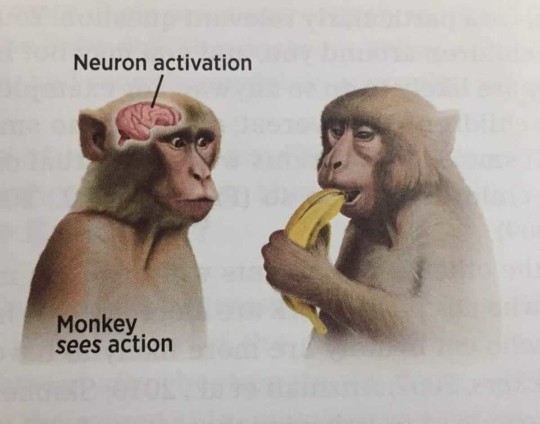
In the ongoing project of rescuing useful thoughts off Xwitter, here's another hot take of mine, reheated:
"Being good for a reward isn’t being good---it’s just optimal play."
The quote comes from Luke Gearing and his excellent post "Against Incentive", to which I had been reacting.
My thread was mainly intended as a fulsome nodding along to one of Luke's points. It was posted in 2021, and extended in 2023 after Sidney Icarus posed a question to it. So it is two threads.
Here they are, properly paragraphed, hopefully more cleanly expressed:
+++
(Don't) Incentivise Ethical Behaviour
This is my main problem with mechanically rewarding pro-social play: a character's ethical choice is rendered mercenary.
As Luke Gearing puts it:
"Being good for a reward isn’t being good---it’s just optimal play."
Bear in mind that I'm not saying that pro-social play can't have rewarding outcomes for players. Any decision should have consequences in the fiction. It serves the ideal of portraying a living, world to have these consequences rendered diegetic:
The townsfolk are thankful; the goblins remember your mercy; pamphlets appear, quoting from your revolutionary speech.
What I am saying is that rewarding abstract mechanical benefits (XP tickets, metacurrency points, etc) for ethical decisions stinks.
+
A subtle but absolutely essential distinction, when it comes to portraying and exploring ethics / morality, in roleplaying games.
Say you reward bonus XP for sparing goblins.
Are your players making a decisions based on how much they value life / the personhood of goblins? Or are they making a decision based on how much they want XP?
Say you declare: "If you help the villagers, the party receives a +1 attitude modifier in this village."
Are your players assisting the community because it is the right thing to do, or are they playing optimally, for a +1 effect?
+
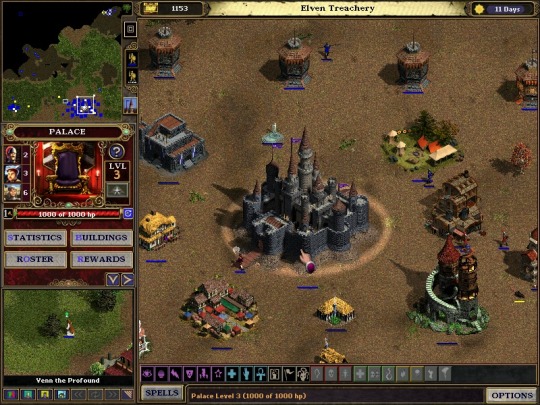
XP As Currency
XP is the ur-example of incentive in TTRPGs. It began with D&D's gold-for-XP, and has never strayed far from that logic.
XP is still currency. Do things the GM / game designer wants you to do? Get paid.
Players use XP to buy better mechanical tools (levels, skills, abilities)---which they can then in turn use to better perform the actions that will net them XP.
Like using gold you stole from goblins to buy a sword, so you can now rob orcs.
I genuinely feel that such systems are valuable. They are models that illuminate the drives fuelling amoral / unethical behaviour.
Material gain is the drive of land-grabbing and colonialism. Logger-barons and empires do get wealthier and more privileged, as a reward for their terrible actions.
+
If you want to present an ethical choice in play, congruent to our real-life dilemmas, there is value in asking:
"Hey, if you kill the goblins you can grab their treasure, and you will get richer. There's no reward for sparing their lives, except that they are thankful."
Which is another way of asking:
"Does your commitment to the ideal of preserving life outweigh the guaranteed material incentives for taking life?"
The ethical choice is the difficult choice, precisely because it involves---as it often does, in real life---sacrificing personal growth and gain. Doling out an XP bounty for doing the right thing makes the ethical choice moot.
"I as the player am making a mechanically optimal choice, but my character is making an ethical choice!"
A cop-out. Owning your cake and eating it too. The fictional fig-leaf of empathy over a calculated a decision to make profit.
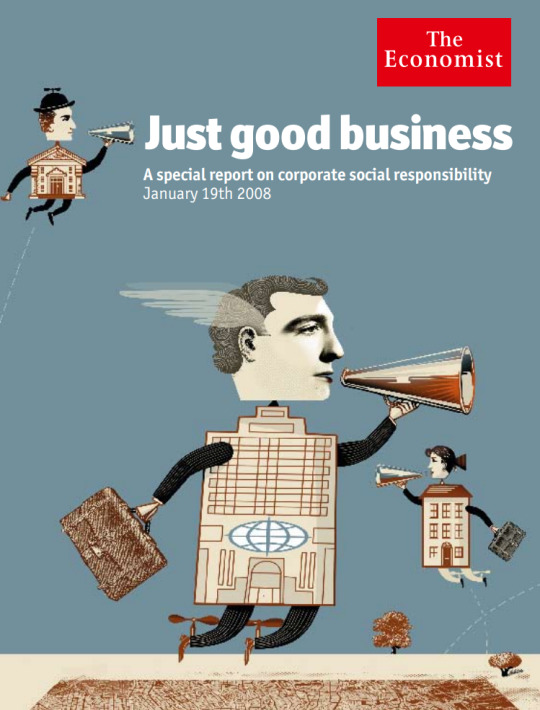
+
Sidney Icarus asks a question which I will quote here:
"... those who hold to their beliefs of good behaviour don't feel rewarded, and therefore feel punished. And that's not a good feeling.
It's an unpleasant experience to play a game where the righteous players are in rags, and the mercenary fucks have crowns and sceptres.
So, what's the design opportunity? How do we make doing the right thing feel pleasant without making it mercenary? Or, like reality, do we acknowledge that ethical acts are valuable only intrinsically and philosophically?
I have no idea how to reconcile this."
I would suggest that the above dichotomy---"righteous players in rags, mercs in crowns"---is true if property is recognised as the only true incentive.
+
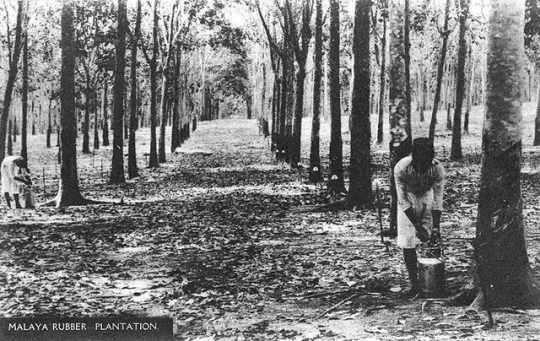
Friends As Property
Modern games try to solve the righteous-players-in-rags "problem" in various ways. Virtue might not net you treasure or XP, but may give you:
Contact or ally slots, which you can fill in;
Relationship meters you can watch tick up;
Favour points you can cash in later;
etc.
How different are these mechanical incentives from treasure or XP, really?
Your relationships with supposedly living, breathing beings are transformed into abilities for your character: skills you can train; powers you can reliably proc. Pump your relationship score with the orc tribe until calling on them for reinforcements becomes a once-per-month ability.
Relationships become contracts. Regard becomes debt. Put your friend in an ally slot, so they become a tool.
If this is what you want play to be---totally fine! As stated previously, games say powerful things when they portray the engines of profit and property.
But I personally don't think game designers should design employer-employee relationships and disguise these as instances of mutual aid.
+
Friends As Friends
In the OSR campaigns I'm part of, I keep forgetting to record money. Which is usually a big deal in such games, seeing as they are in the grand tradition of gold-for-XP?
In both games, my characters are still 1st-Level pukes, though it's been months.
I'm having a blast, anyway.
My GMs, by virtue of running organic, reactive worlds, have made play rewarding for me. NPCs / geographies remember the party's previous actions, and respond accordingly.
I've been given gills from a river god, after constant prayer;
I've befriended a village of monsters, where we now live;
I've parleyed with the witch of a whole forest, where we may now tread;
I've a boon from the touch of wood wose, after answering his summons.
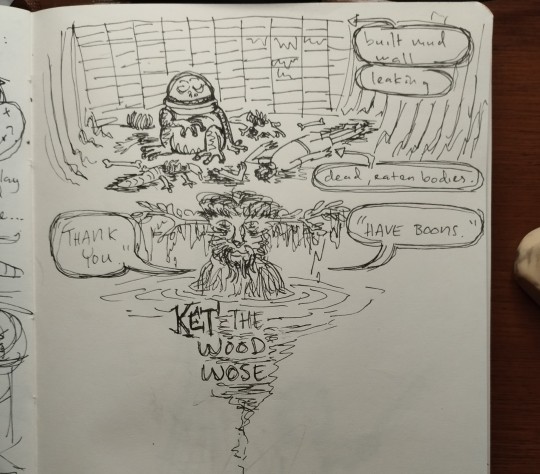
I cannot count on the wood wose showing up. He is a character in the world, not a power I control. Calling on the wood wose might become a whole adventure.
Little of this stuff is codified my stats or abilities or equipment list. They are mostly all under "misc notes".
Diegetic growth. Narrative change that spirals into more play.
This is the design opportunity, to me:
How do we shape TTRPG play culture in such a way that the "misc notes" gaps in our games are as fun as the systemised bits? What kinds of orientation tools must we provide? What should we say, in our advice sections?
+
A Note About Trust
The reason why it is so hard to imagine play beyond conventional incentive structures has a lot to do with trust.
Sidney again:
One of the core issues is the "low trust table". I'm not designing just for myself but for my audience. For a product. How much can I ask purchasers and their friends to codesign this part with me?
Nerds love numbers and things we can write down in inventories or slots because they are sureties. We've learned to fear fiat or player discretion, traumatised as we are by Problem GMs or That Guys.
The reason why the poverty in Sidney's hypothetical ("righteous players are in rags") sounds so bad is because in truth it represents risk at the game table. If you don't participate in the mechanics legible to your ruleset (the XP and gear to do more game things), you risk gradually being excluded from play.
You have no assurance your fellow players will know how hold space for you; be considerate; work together to portray a living world where NPCs react in meaningful ways---in ways that will be fun and rewarding for everybody playing.
You are giving up the guarantee of mechanical relevance for the possibility of fun interactions and creative social play.
+
The "low trust table" is learned behaviour--the cruft of gamer culture and trauma.
When I game with folks new to TTRPGs, they tend to be decent, considerate. I think there's enough anecdotal evidence from folks playing with school kids / newcomers / etc to suggest my experience is not unique.
If the "low trust table" is indeed learned behaviour, it can be unlearned.
Which rules conventions, now part of the hobby mainstream, were the result of designers designing defensively---shadowboxing against terrible players and the spectre of "unfairness"?
How can we "undesign" such conventions?
Lack of trust is a problem that we have to address in play culture, not rulesets. You cannot cook a dish so good it forces diners to have good table manners.
+
This is too long already. I'll end with an observation:
Elfgames are not praxis, but doesn't this specific dilemma in the microcosm of our silly elfgames ultimately mirror real-world ethics?
To be moral is to trust in a better world; to be amoral / immoral is to hedge against the guarantee of a worse one.
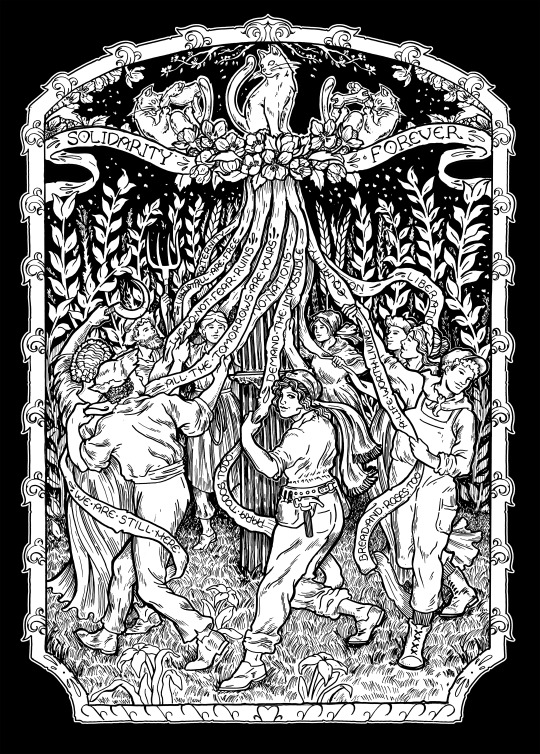
+++
Further Reading
Some words from around the TTRPG community about incentive and advancement in games:
+
However, the reason there is a big debate about this is that behavioural incentives in games clearly do work, either entirely or at various levels. This applies outside gaming, as well. Why do advertising companies and retail business use "rewards" structures to convince people to buy more of their products? Why do people chase after "Likes" on social media?
A comment by Paul_T to "A Hypothesis on Behavioral Incentives"
from a discussion on Story-Games.com
+
the structure and symbolism of the D&D game align with certain structures and values of patriarchy. The game is designed to last infinitely by shifting goalposts of character experience in terms of increasing amounts of gold pieces acquired; this resembles the modus operandi of phallic desire which seeks out object after object (most typically, women) in order to quench a lack which always reasserts itself.
D&D's Obsession With Phallic Desire
from Traverse Fantasy
+
In short, my feeling is that rewarding players with character improvement in return for achieving goals in a specific way impedes some of the key strengths of TTRPGs for little or no benefit in return.
Incentives
from Bastionland
+
When good deeds arise naturally out of the players choices, especially when players rejected other options that were more beneficial to them, it is immensely satisfying. Far more than if players are just assumed to be heroic by default. It gives agency and meaning to player choice.
Make Players Choose To Be Kind
from Cosmic Orrery
+
Much has been made about 1 GP = 1 XP as the core gameplay loop driver of TSR D+D. But XP for gold retrieved also winds up being something of a de facto capitalistic outlook as well. Success is driven by accumulation of individual wealth -- by an adventuring company, even! So what's a new framework that can be used for underpinning a leftist OSR campaign?
A Spectre (7+3 HD) Is Haunting the Flaeness: Towards a Leftist OSR
from Legacy of the Bieth
+
Growth should be tied to a specific experience occurring in the fiction.
It is more important for a PC to grow more interesting than more skilled or capable.
PCs experience growth not necessarily because they’ve gotten more skill and experience, but because they are changed in a significant way.
Cairn FAQ
from Cairn RPG / Yochai Gal
+++
Thank you Ram for the Story-Games.com deep cut!
( Image sources:
https://knowyourmeme.com/memes/neuron-activation
https://en.wikipedia.org/wiki/Majesty:_The_Fantasy_Kingdom_Sim
https://www.economist.com/sites/default/files/special-reports-pdfs/10490978.pdf
https://varnam.my/34311/untold-tales-of-indian-labourers-from-rubber-plantations-during-pre-independence-malaya/
https://nobonzo.com/ )
+
PS: used with permission from Sandro, art by Maxa', a reminder to self:
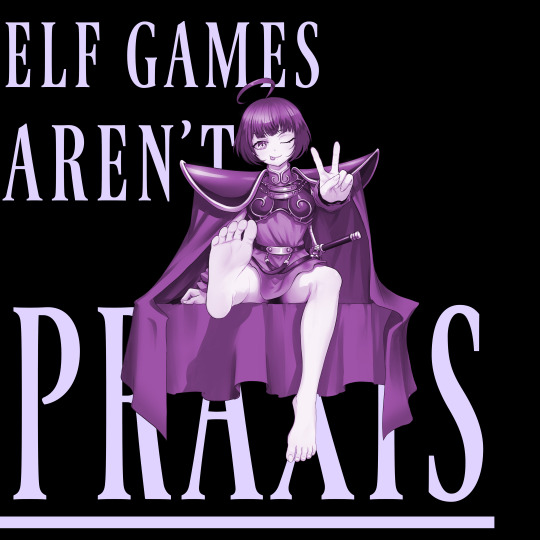
250 notes
·
View notes
Text
Kerch, Ghezenism, and the Van Eck Family
The title pretty much sums it up. This is a rather extensive analysis, and to be honest with you all it is 2,500+ words. So get into this absolute beast at your own risk!
~~~
From my experience in this fandom, I've seen it discussed very frequently how important religion is in the Grishaverse. Not only is it very deeply developed, to the point where many of the different countries have unique beliefs - which I'm not sure is seen very often in newer literature - but the various religious systems are also deeply important to many major characters, such as Matthias and Inej. However, one aspect of Grishaverse religions that seems to be overlooked somewhat often is the Kerch religion of Ghezenism. This may just be me, but I have a lot of thoughts on it. A big reason for that is that Wylan is, and always has been, my favorite character, and the culture surrounding Ghezen is actually a very important part of his character for many reasons. When you look into it in the way that I have, you discover that there are a lot of peculiar aspects of Ghezenism that make it stand out, as well as many ties that it has to major aspects of the story.
Right away, one thing that makes Kerch religion different from the others is how deeply connected to the economy it is. So much so that a lot of aspects of the two subjects are one and the same. Given that Ketterdam is a city largely fueled by commerce, it makes sense that Ghezenism would heavily tie into Kerch culture as well. Symbols of Ghezen can be found in many places throughout the city, even beyond the Church of Barter. A very good example of this is Vellgeluk, the island where the Crows meet Van Eck expecting to get their reward from the Ice Court heist: “Smugglers called it Vellgeluk, “good luck,” because of the paintings still visible around the base of what would have been the obelisk tower: golden circles meant to represent coins, symbols of favor from Ghezen, the god of industry and commerce,” (Six of Crows, Chapter 44). This just goes to show how many people in Ketterdam, and the wider country of Kerch as well, put their faith in Ghezen. Vellgeluk is a chosen place for smugglers to do business, specifically because favors of Ghezen are still present there.
Another interesting part of that passage is the fact that Ghezen is referred to as the god of industry and commerce. Kerch may have other gods, but as far as I can remember - and I may be wrong, but I don't think I am - we never hear about any of them. A similar situation can be found in Fjerda, where Djel is specifically the god of life, implying the existence of other gods. In Fjerda, it is very clear that Djel is mainly what they base their culture and belief system around. This makes perfect sense for a god of life, but isn't Ketterdam’s situation a bit more unusual? The most frequently discussed god, Ghezen, represents industry. We can assume Ghezen is the primary god within the Kerch religious system. Not to mention that their largest church is called the Church of Barter, barter obviously being a term that has much to do with economics. Ketterdam, if not the entire country of Kerch, seems to have no real concept of the separation of church and state. They quite literally hold auctions inside of the church; the auctioning of Kuwei is not a singular event.
The impacts of religion can also be seen in the culture and behavior of the people of Kerch, as seen in a brief section of Crooked Kingdom. “Kerch women—even the wealthy ones—didn’t bother with anything as frivolous as embroidery or needlepoint. Ghezen was better served by tasks that benefited the household,” (Crooked Kingdom, Chapter 14). Obviously, things like this are much more typical of religion. But I would argue that even this holds traces of the same values expressed by the connection between Ghezenism and the economy. It is specifically mentioned here that Kerch women are encouraged to participate in tasks that will “benefit the household”. This displays one of the very prominent aspects of the Ghezenite religion, which is that one of the most important things a person can do is be productive, and create a prosperous life for themselves and their family.
In addition to direct ties between Ghezenism and the Kerch economy, occasionally the legal system is put into the mix as well. While considering what consequences his father might face after the events of the auction, Wylan reveals this piece of information: “Knowingly entering into a false contract for the purpose of subverting the market wasn’t just illegal, it was considered blasphemy, a blight on the works of Ghezen, and the penalties were harsh,” (Crooked Kingdom, Chapter 41). Essentially what he means by this is that not only is tampering with the economy against the law, but it is also heavily frowned upon in a religious sense, and anyone who does so will face punishment from both sides. This is extremely unique, even within the Grishaverse. This single sentence also reveals another very interesting thing about Kerch society. The market, as it exists in Ketterdam, is believed to be a creation of god - it is referred to here as being a part of the “works of Ghezen”. That, more than anything, is concrete proof of just how interconnected the economy of Kerch is with its primary religion. This also means that committing a crime such as Van Eck did isn't simply illegal (which we can assume he has no issues with), it is also an act that goes against his own religion. But stop to consider for a moment: does he really have a problem with that either?
There are numerous examples throughout both books of Van Eck blatantly abusing the values of his own religion. On its own, the teachings of Ghezenism aren't inherently bad. After all, things such as tampering with the market for your own gain are actively discouraged using the threat of blasphemy, which I'd say is generally beneficial. The issue, however, arises when Van Eck in particular attempts to twist some of these values in order to justify his own actions. If there is one single quote from the duology that exemplifies this, it would be this one: “Ghezen shows his favor to those who are deserving, to those who build cities, not the rats who eat away at their foundations. He has blessed me and my dealings. You will perish, and I will prosper. That is Ghezen’s will,” (Six of Crows, Chapter 45). Van Eck openly believes that, since he is a member of the upper class, he is somehow more deserving of a blessing. He is insistent that “Ghezen's will”, or what he interprets as what Ghezen wishes for him to do, is to trample others in order to further his own success.
It doesn't matter to him who stands in his way, and it never will, because his goal is only to make himself more wealthy; he simply hides this behind a thin veil of piety. This motivation is especially clear when he is speaking to Inej while he is holding her captive. “When I leave this world, the greatest shipping empire ever known will remain, an engine of wealth, a tribute to Ghezen and a sign of his favor. Who will remember a girl like you, Miss Ghafa? What will you and Kaz Brekker leave behind but corpses to be burned on the Reaper’s Barge?” (Crooked Kingdom, Chapter 7). He frames people less fortunate than him - in this case Kaz and Inej - as forgettable and unimportant. The only thing he considers truly important is wealth, which he equates to power. He even references Ghezen here, claiming again that all of his actions, as well as his empire and legacy, are meant to show his dedication to his religion. He also claims that his ability to attain this level of success is a sign that Ghezen favors him. That in particular is a display of his extremely warped view of Ghezenism. The truth is that his success can only be attributed to his unethical actions, but the fact that he claims it is due to Ghezen's favor means that he will never be able to be convinced that he is wrong. He has what he believes to be an airtight justification.
His classism is also extremely evident, while indirectly, in an exchange between Kaz and Wylan earlier on in Crooked Kingdom. ““Your father much for charity?” “No. He tithes to Ghezen, but he says charity robs men of the chance at honest labor,”” (Crooked Kingdom, Chapter 2). This shows that Van Eck is very protective over his wealth. Which, quite frankly, is more likely than not the exact opposite of what Ghezenism is intended to promote. Based on what we are shown from an outside perspective, it seems as though one of the main aspects of Ghezenism is to create a prosperous economy for everyone. However, what Van Eck seems to believe is that he is intended to simply accumulate as much wealth as he possibly can, and keep it all for himself.
It is incredibly clear that Van Eck doesn't care about the well-being of anyone other than himself when it comes down to it. It could be argued that he cares for Alys, and will care for their child when it is born, but this simply cannot be proven. Just look at the exact mirror of this situation: Marya and Wylan. Wylan states about his parents, “I think he really loved her. They fought all the time, sometimes about me, but I remember them laughing a lot together too,” (Crooked Kingdom, Chapter 14). If we are to believe that this is true, and Van Eck truly did love Marya, that doesn't change the fact that he didn't hesitate to send her away as soon as he discovered that Wylan couldn't read or write. There is no evidence to say that he wouldn't do the same to Alys, under similar circumstances.
And, of course, this all leads back to the matter of Wylan. When Van Eck decided that Wylan wouldn't be useful to him, he stopped caring about him very quickly. Near the end of Six of Crows, we hear more of the specifics on Van Eck's opinion of Wylan. “I have hired the best tutors from every corner of the world. I’ve tried specialists, tonics, beatings, hypnotism. But he refused to be taught. I finally had to accept that Ghezen saw fit to curse me with a moron for a child. Wylan is a boy who will never grow to be a man. He is a disgrace to my house,” (Six of Crows, Chapter 45). Van Eck believes that Wylan is a curse from Ghezen, purely because he thinks that Wylan will be incapable of producing profits for their business. This is perhaps one of the most egregious examples of his blatant abuse of his own religion, because he is entirely willing to abandon and even murder his own son in order to fulfill his goals, which he claims is all Ghezen's will.
There is no feasible way Wylan would be able to grow up being raised by Van Eck, and not be affected by his religious ideas in some way. In fact, there is evidence contained in the text that proves this rather thoroughly. There are even certain things that have already been cited within this analysis that can be circled back to, such as the quote just above. This quote exemplifies the sort of treatment Wylan was subjected to while growing up. This is mostly speculation, but it's safe to assume he was told at a very young age that his own father considered him a punishment from god. That is objectively terrible, and we know that by the age of eight his father was his only parent. The psychological impacts that that would have on a child that young are unimaginable.
Additionally, we can return to this quote from Crooked Kingdom: “When I leave this world, the greatest shipping empire ever known will remain, an engine of wealth, a tribute to Ghezen and a sign of his favor. Who will remember a girl like you, Miss Ghafa? What will you and Kaz Brekker leave behind but corpses to be burned on the Reaper’s Barge?” (Crooked Kingdom, Chapter 7). While Van Eck is not talking to Wylan here, and Wylan isn't even present at the time, this passage still indirectly displays Van Eck's feelings about Wylan. Here he is expressing the fact that he maintains that if a person is not able to create wealth and prosperity for themselves, they are essentially useless. As we know from the previous example, he believes this of Wylan as well.
It is evident that Wylan was taught Ghezenite values from a young age. While examining the exterior of the Church of Barter, his thoughts include this: “He didn’t need to be able to read the words engraved over the arch. He’d heard his father repeat them countless times. Enjent, Voorhent, Almhent. Industry, Integrity, Prosperity,” (Crooked Kingdom, Chapter 31). This is confirmation that Van Eck frequently encouraged Wylan to think about these values, and it can be inferred that it likely wasn't in a particularly positive manner. Industry, integrity, and prosperity are clearly the three main ideals of this religion, and we can easily be led to the conclusion that Van Eck is certain his son is capable of none of them.
It is also suggested that Wylan may even associate his father's disapproval with religion subconsciously as well. A good example of this is in Crooked Kingdom, after Wylan is taken to the Church of Barter. “Van Eck shook his head. “Every time I think you cannot disappoint me further, you prove me wrong.” They were in a small chapel topped by a dome. The oil paintings on the wall featured battle scenes and piles of armaments,” (Crooked Kingdom, Chapter 31). While this is also simply meant to provide the reader with a description of the environment, the juxtaposition between the two halves of this passage cannot be an accident. What we can observe here is that after Van Eck once again expresses his ever-present disappointment with Wylan, emphasis is immediately put on the fact that they are in the church. This, along with the other passages listed, creates a clear link between Wylan's negative relationship with his father and the effects that their shared religion has had on it.
What I consider to be one of the most important quotes for this subject, despite also being the shortest one used, comes near the end of Six of Crows. After Wylan has played his role in foiling Van Eck's plan to trick the Crows, he says this: “Maybe you can pray to Ghezen for understanding, Father,” (Six of Crows, Chapter 45). This is sort of the first act of retribution that the reader sees from Wylan. He has just made his father look like a fool, and then he practically spits in his face by taking the thing that was used against him for so long - their religion - and using it against his father instead. Not only is this moment incredibly satisfying, it also marks the beginning of Wylan's growth as a character that eventually leads to him being able to stand up to his father in more ways.
Despite being arguably the least explored Grishaverse religion in online spaces, I find Ghezenism to be extremely interesting when it comes to the ways it ties into the themes of the story. It represents wider, more general themes found throughout the book, such as the idea that people often value their own success over the well-being of others, but it contains even more when examined under a closer lens. It opens the door to a completely new aspect of further analyzing the relationship between Wylan and his father, and introduces vital elements of in-depth characterization for both of them. The way Wylan and Van Eck each view the same religion is highly indicative of their individual values, and that is a very interesting thing to expand upon. It simply goes to show just how much thought went into creating both the culture of this world, and the characters who live within it.
#this is virtually just a huge monster of a brain dump#don't bully me too hard if some details are off guys#six of crows#crooked kingdom#leigh bardugo#grishaverse#shadow and bone netflix#shadow and bone#shadow and bone s2#wylan van eck#wylan hendriks#soc wylan#wylan soc#wesper#jan van eck#marya hendriks#alys van eck#ketterdam
223 notes
·
View notes
Text
On the topic of Eclipse, I also would love to talk about how he works best off of a reward based system.
After the stern conversation he had with Puppet, Eclipse did go ask Moonlight in a nicer manner about reviewing his killcode. It wasn’t until after Moonlight continued to push the situation that Eclipse almost turned and left.
Moonlight wasn’t in the wrong for trying to push for more polite manners from Eclipse. Asking for things like “please” is literally asking for baseline kindness and respect. The problem is, even doing that is a huge thing for Eclipse. And instead of getting a reward out of what he just did, Moonlight asked even more out of it.
Eclipse is very reward-driven. If he does something, he must get something out of it. If he does something and feels he has gained nothing, then there is no point in doing said thing in the first place. Saying “please” did earn him the right to look at Moonlight’s coding, but that reward felt smothered by the fact that, to Moonlight, please wasn’t enough.
It circles right back to Eclipse feeling like he is enough.
It’s kind of like when you do something you feel is a big achievement, something you were finally able to do after a long time of not being able to, and everyone just saying “cool” and moving on. Eclipse feels like he is putting in the effort and no one is seeing it. Even though what he is doing seem like normal everyday things other people just do, they’re huge strides for Eclipse.
Eclipse is getting better, but his progress is being slowed by the people around him. Funnily enough, even by the same people trying to help him. Part of helping someone through their trauma is learning their reward system. Figure out what they view as praise for their efforts, so you can reward them when they have made progress. It’s part of the process currently being overlooked by the others like Puppet. They want him to get better without showing him how proud they are of his effort.
“Puppet tells Eclipse she’s proud of him all the time!” Yes, but that’s not what Eclipse views as a reward. Words are very easily twisted, they have never been something Eclipse can rely on. He also can’t trust people who say they’re going to stick by his side. People have said that several times and betrayed him anyways. He won’t trust it at this point. He needs something solid.
(This is part of the reason why I think he got so easily attached to Earth. Earth is very big on rewarding people for seemingly small things. She makes the effort to actually understand how he feels about something instead of just calling him “difficult” or “stubborn”. He tells her about things he��s achieved and she is genuinely happy for him and interested in learning more. It’s where most other people fail. They invite Eclipse to do things, but it’s never what Eclipse wants. Moonlight was probably the only other one who tired to show interest in what Eclipse wanted to do before that whole relationship fell apart.)
#🌟 Ten Talks#tsams#sams#eaps#the sun and moon show#sun and moon show#eclipse and puppet show#tsams eclipse
100 notes
·
View notes
Text


Blue Lock was masterfully crafted to build a Japan team capable of winning the World Cup, bringing some of the most talented players together to work their strengths and weaknesses. But what if it doesn’t work?
The players are great, have drive and determination, but what if it’s not enough? What if they need more incentive to reach the top? Which is the reason Ego brings in a pretty thing like you.
You can feel his breath against your neck as he speaks into the camera, unable to see the sets of eyes watching you on the large screen as you suddenly feel vulnerable. Ego’s hands settled on your waist as he talks, fingers dipping into the plush skin as he gives them the rules. It’s simple really. Whoever reaches the top gets the prize, you.
Your chest feels tight as he continues to break down the point system, even with such a seedy agreement he’s still interested in what’s fair. Not that anything was really fair when you didn’t have a choice to be here, although Ego would tell you that you could leave at any time. And you supposed you could, you could walk out that door and forget all about this depraved arrangement that you’d agreed to. The contract didn’t start until first play, and first play was in four hours. But money was money, and your debts would continue to pile, work would continue to run you into the ground, and you’d continue this lifeless cycle of misery. Anything was better than that.
But what you couldn’t see was the dark, depraved looks in the players eyes as they watched your pretty face enlarged on the big screen. Each man finding their own renewed vigour at the sight of you, another trophy to add to their collection as their names appeared on the leaderboard. Each man with no points between their name, a level playing field. For now.
Ego continued to list through the rewards the team could win for each tier of points, every salacious sex act he listed had the men hanging on his every word. Calculating in their minds how many goals they would have to secure to have you, and the number needed to win the grand prize.
Because giving away cheap frivolity would only keep hungry men satiated for so long, it was about time that they were given a chance to hunt a more coveted prize. Kunigami’s throat bobbed as he swallowed thickly, golden eyes glancing to his side to see who else seemed intent on winning. A dark, sinister smirk appeared in Shidou’s face as his eyes shamelessly roamed your exposed skin, while Raichi’s hands balled into fists beside him. Chigiri’s expression was unreadable but he could feel the ache between his thighs as he took in the way your lips curled into a pretty pout, as Bachira began to jump on toe to toe. The lions were about to be unleashed from the den.
“Game on.”

Please be mindful of the warnings which will be displayed at the top of each chapter, but each will be labelled as non/dub-con just to be safe. There is no upload schedule for this so new players will be added as inspiration strikes.



✦ Kaiser Michael
✦ Shidou Ryusei
✦ Aiku Oliver
✦ Kunigami Rensuke
✦ Mikage Reo
✦ Shouei Barou
✦ Raichi Jingo
✦ Ness Alexis & Kaiser Michael
✦ Chigiri Hyoma
✦ More to be added...

Based on this post.
#blue lock x reader#blue lock smut#bllk smut#bllk x reader#blue lock x you#trigger:noncon#tw:dubcon#trigger:dubcon#tw:noncon#if there's someone you wanna see lemme know!!#posting Kaiser first in a few!!!
762 notes
·
View notes
Text
Okay, but why the "Kannabi" Bridge? I mean, why is this called that? Turns out, this is an amazing and very beautiful metaphor.
Kakashi Gaiden analysis. Kannabi — the bridge between two worlds
I will look at this from the side of Shinto culture (based on the materials that I could find, feel free to correct me if you know more about this) and from the side of Kakashi and Obito's storylines.
Contents | cultural code · significance for the plot structure · the idea itself (this one is really important!)
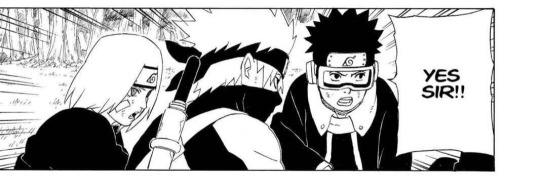
Cultural code
In Shinto culture, it is not customary to divide the world into human and sacred, especially into divine and demonic principles — everything exists in harmony with each other, in a single system.
Kannabi (神奈備) refers to a region that is a shintai (repositories in which kami reside) itself, or hosts a kami. In fact, Kannabi is a place of connection between the human and the spiritual. Usually these are mountains, rivers, and forests that stand out for their beauty. These are such accumulations of natural energy, so sacred that their presence requires observance of a certain rite. So, if in relatively modern times be present next to the blossoming sakura, picnics in picturesque mountains and the like has normalized in Japanese culture, then in ancient times people did not dare to disturb mountains or groves with their presence. In such places, people performed rituals of worship to the deity, wrestling matches, divination, sacred dances, offerings, etc. The territory of the kami did not completely coincide with the territory of worship to them, people still tried to move away from the center of the sacred place so as not to bother their deity. To mark the border of entry into Kannabi, symbolic gates were installed — most often in the form of torii.
examples of kannabi in real life. Mount Fuji and Nachi Falls. [ as I understand, shintai and kannabi are synonymous concepts, but kannabi is broader in meaning. ]


It's all about how important the term is in a cultural context. A place of divine power that cannot be desecrated. From here, the Kannabi Bridge and the surrounding area can also be considered endowed with divine energy — and here the most interesting thing begins.
Significance for the plot structure
Now about the scenario composition. In general, the Battle of Kannabi, as the event itself in Kakashi and Obito's storylines, according to Joseph Campbell's «hero's journey», is a stage of transition between worlds. That's what the symbolism of the place also works for. This is the moment when the hero assumes responsibility for the beliefs he carries and their consequences, and literally or symbolically crosses the threshold between the safe and familiar world to the dangerous and unknown one, embarks on the path of reflection and prepares to meet the unconscious.
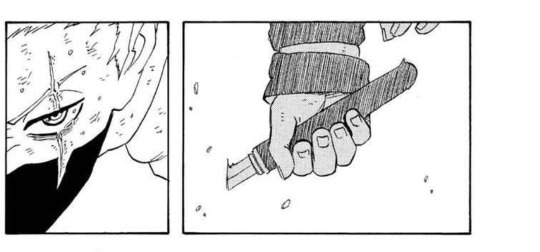
Thus, briefly speaking, Kakashi finds the strength to resolve his internal conflict in favor of his father's attitudes about the value of each Shinobi, and Obito sacrifices himself, protecting his loved ones and defending his ideals. Then their paths got separate so that each one could face with the unknown by himself.
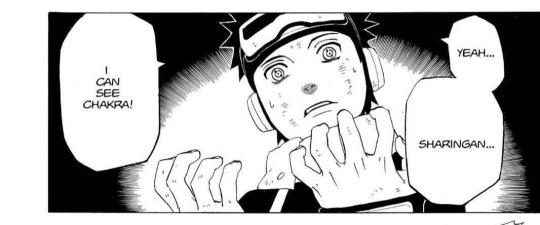
In the context of the monomyph model, this is how the beginning of the initiation stage is demonstrated (i.e., the transition from one state to another, which is accompanied by some kind of ritual). Since Kannabi in culture is the boundary between the human and the divine, it can be concluded that this very transition is shown almost literally, thanks to the sharingan awakening and the broken tanto. This is the first turning point in history, structurally coinciding with the end of the first act.
The idea itself
And what do we see in general? In the battle of Kannabi, the religious Shinto subtext is vividly read. For the battle in a sacred place, the moral positive change of the hero (Kakashi) or his original courage (Obito) and a certain sacrifice (Kakashi's eye), the deities give a reward: the power of sharingan, which helps them save Rin, which is shared between Obito and Kakashi and in the future generally serves as a direct demonstration of the spiritual connection between them. At the same time, for the desecration of a sacred place (the goal of the mission was to blow up a bridge), heroes are punished: from this point of view, Obito's death is a certain sacrifice for the damage inflicted on the deity.
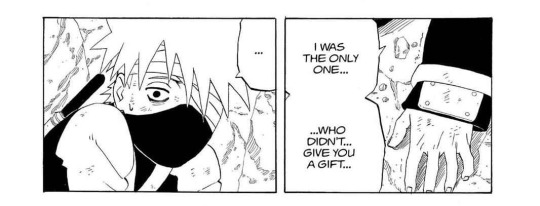
There is also information that the name of the bridge - Kannabi-kyo (神無毘橋) - can also be interpreted as «A bridge where the gods won't help». idk if it's true, but sounds cool.
Moreover, the very name of Obito's mangekyo — Kamui (神威) — literally translates as «The Power of Gods». Perhaps it is based on the mentioned concept of the place where Kakashi and Obito received the power of sharingan. And maybe that's why they call the technique the same way: because they treat it rather with such a religious meaning.
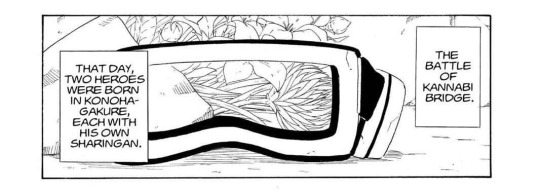
and thanks for reading to the end ♡
#honestly this is one of my favourite things in gaiden so complex and interesting and ughhh–#naruto#naruto shippuden#team minato#kakashi hatake#obito uchiha#rin nohara
174 notes
·
View notes